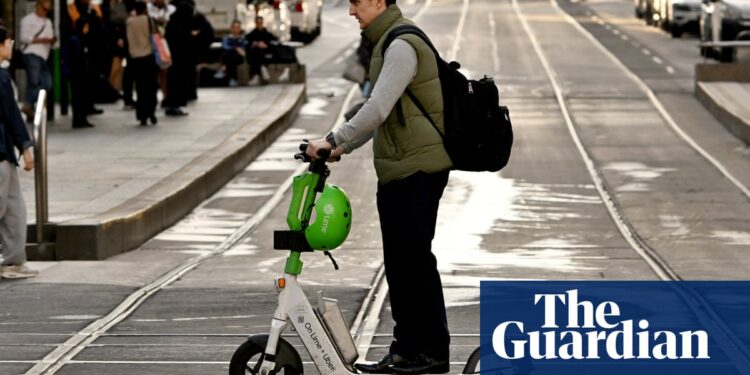Victoria’s e-scooters wars have ramped up, with mayors in Melbourne’s north uniting to back e-scooter hire schemes after the mayor banned them from operating in the inner city.
The mayor, Nicholas Reece, succeeded in banning the rentals in the city council area, arguing the e-scooters presented an unacceptable safety risk and that Melbourne’s city needed a reset.
But three mayors in neighbouring councils have signalled their intention to work together to investigate creating a shared e-scooter zone.
Merri-bek council’s Adam Pulford, Darebin’s Susanne Newton and Moonee Valley’s Pierce Tyson said e-scooters were a cheap alternative transport mode and would help reduce road congestion and cut air and climate pollution.
“There are also critical gaps in traveling east to west across our municipalities, and e-scooters and e-bikes could save people time by avoiding a long public transport trip in and out of the city,” the statement, first published in the Age, said.
“We want to see if we can bring shared e-scooters and e-bikes in as an option for our residents, while working together so that we can address the parking and compliance issues that have been experienced through the existing trials.”
Newton said she regularly saw e-scooters along the border of Darebin and Yarra city council – one of three council areas that hosted a trial of the vehicles.
“It’s so clear there is a desire to go into Darebin,” she said.
Newton urged Melbourne city council to reconsider the ban, saying it would make the “city disconnected”.
“Melbourne is such a key piece but we’ll do it regardless,” she said.
The Victorian premier, Jacinta Allan, has alsovoiced concern about the City of Melbourne’s decision.
Last week, she called on the council to reconsider its ban, saying she believed there was a role for e-scooters in Melbourne.
Allan did not rule out potential state government intervention, but the government has not outlined what this would entail.
Victoria’s e-scooter trial began in February 2022, with 1,500 Lime and Neuron vehicles initially placed across three council areas – Melbourne, Port Phillip and Yarra.
Last month, the state government announced e-scooter hire schemes would be permanently legal from October.
The government also announced tougher rules and penalties, including increased fines for riding on the footpath, not wearing a helmet and drinking alcohol while riding.
Legislation will also be introduced to parliament next year setting out minimum standards for operators and councils.
Melbourne city council’s ban comes months ahead of the October elections where Reece is hoping to retain the mayorship.
Speaking to Triple M radio this week, Allan said she was “struggling” to understand the council’s logic and reiterated she hoped the council would have a change of heart.
after newsletter promotion
A Victorian government spokesperson said it was disappointed with Melbourne council’s decision to end the scheme.
“Four weeks ago Mr Reece said the scheme had been good for everyone – and meant 3m less car trips around the city,” the spokesperson said.
“We know Melbourne’s scheme has been one of the most popular in the world, providing another option for thousands of Victorians to travel home safely – particularly shift workers.”
A Lime spokesperson said the firm was having “ongoing discussions” with Merri-Bek, Darebin and Moonee Valley.
“We are excited at the prospect of providing micromobility to these adjacent operating areas,” the spokesperson said.
“Since the start of 2024, Lime has had more than 40,000 trips end on the northern border of the City of Melbourne solidifying the eagerness of this community for expansion.”
The spokesperson said its e-scooters used geo-fencing technology to virtually manage its service areas.
“This allows us to prohibit vehicles from entering areas, ensure vehicles adhere to the set speed limit and slow them down when they enter certain zones,” the spokesperson said.
“All Lime vehicles have built-in GPS technology that allows their location to be tracked at all times.”
A Neuron spokesperson said it was still receiving numerous inquiries from concerned riders and businesses about the ban.
“We have taken note of the premier’s and transport minister’s comments that e-scooters play an important role in the public transport network, particularly for those last-mile journeys, and for getting cars off local roads,” the spokesperson said.
“We are also aware that a number of Melbourne councils have been frustrated by the City of Melbourne’s decision and would like to see them revisit it.”
The spokesperson said they wanted to see a process that involved broad community consultation.
“We remain convinced that Melbourne is an excellent city for e-scooters, and if given the opportunity, we could quickly implement a number of measures to address many, if not all, of the councillors’ concerns,” they said.







